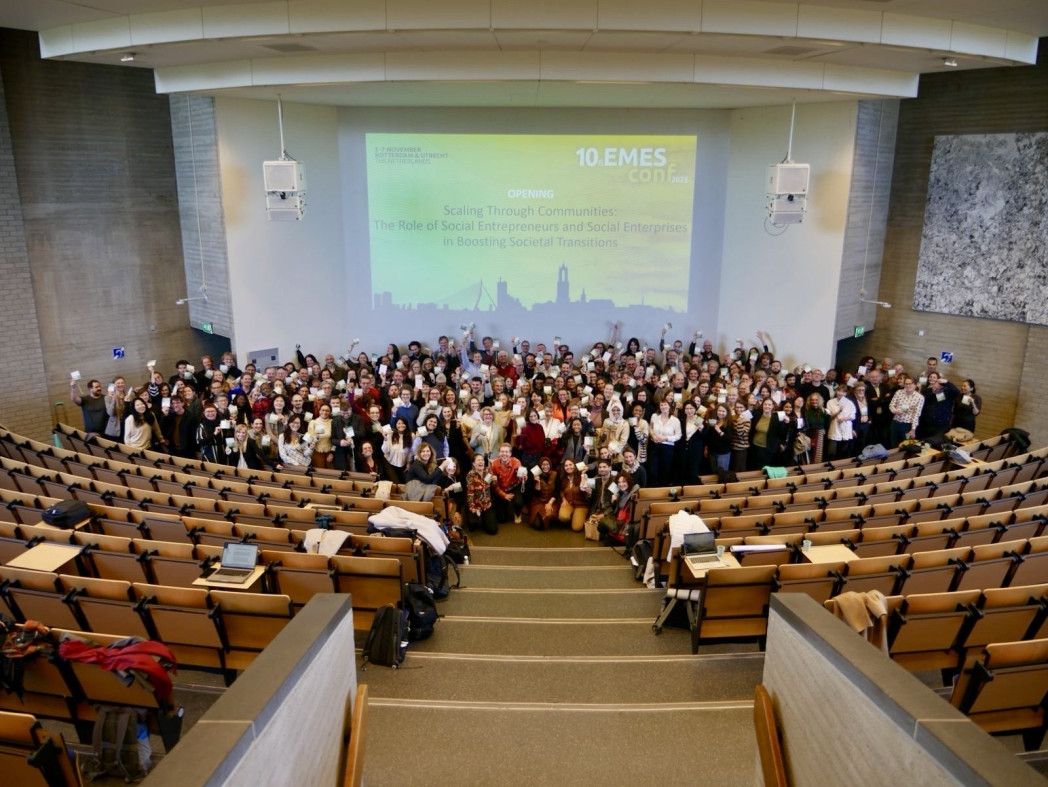
10th EMES Conference 2025: "Scaling Through Communities"
The Competence Centre for the Management of Cooperatives (unibz) participated almost at full capacity with valuable contributions.
As part of the Practitioners’ Lab “Scalable and Inclusive Cooperation – Knowledge Co-creation by Social Entrepreneurs, Cooperatives, Young People, Policymakers and Academics”, chaired by Niels Bosma, Giacomo Buzzao and Manuela Paulmichl (Office for Cooperatives, Autonomous Province of Bozen-Bolzano) presented the contribution “Reattracting Youth to Cooperatives: Which Policy Levers to Transform Co-ops into Meaningful and Flexible Workspaces for the Next Generation?”. Building on the South Tyrolean experience and the Competence Centre’s research, the intervention offered a space of discussion to collectively reflect on how public institutions can stimulate generational renewal within the cooperative movement, by rethinking policy incentives, governance practices, and educational pathways that make cooperatives more attractive to Generation Z. It also highlighted the need to co-create knowledge across academia, practitioners, and youth organizations, aiming to design participatory strategies that support work integration, innovation, and social sustainability in the cooperative ecosystem.
Michela Giovannini presented in the session “SE for Systemic Change 2: Agrifood Transitions” a contribution titled “Impacting Conventional Foodways with Food Democracy: Diverse Scaling Strategies in Alternative Food Networks” (co-authored with Francesca Forno and Ewa Kopczynska). The presentation examined how different Alternative Food Networks (AFNs) in 4 European countries (Nutrire Trento in Italy, Wawelska Food Cooperative in Poland, Hadeland CSA in Norway, and the South West Grain Network in UK) adopt diverse scaling strategies to foster food democracy, inclusiveness, and participatory governance in food systems.
She also chaired the session “Feminist SE 2: Perspectives on Place-Based Social Innovation and SE Ecosystems 13: Indigenous Practices & Local Perspectives”, facilitating discussion on feminist and decolonial approaches to the Social and Solidarity Economy.
Alessandro Narduzzo attended the EMES conference with two contributions. The first presentation analyses the Italian community cooperatives through the lens of innovation and the emergence of a new form of cooperative institution. The second contribution, co-authored and presented with Francesca Zoccarato (unibz), is a paper on the particular fit that social enterprises have with respect to a specific form of circular innovation, known as repurposing, that so far has been largely downplayed.
Finally, Alessandra Piccoli presented on the topic “Institutional Conditions Promoting Social Economy”, co-authored with Richard Lang, Michela Giovannini, Sophie Nørgaard, and Linda Lundgaard Andersen, exploring how the Social Economy creates opportunities for inclusion, particularly for vulnerable groups, and often provides supportive work environments that help people regain dignity and a sense of belonging. Based on the analyzed articles, the discussion highlighted that strengthening this sector requires policies that simplify regulations, offer fiscal incentives, and provide in-kind support. However, what could truly make a difference is the full recognition of the distinctiveness of the Social Economy compared to the market economy, alongside a renewed commitment to social goals within the non-profit sector.